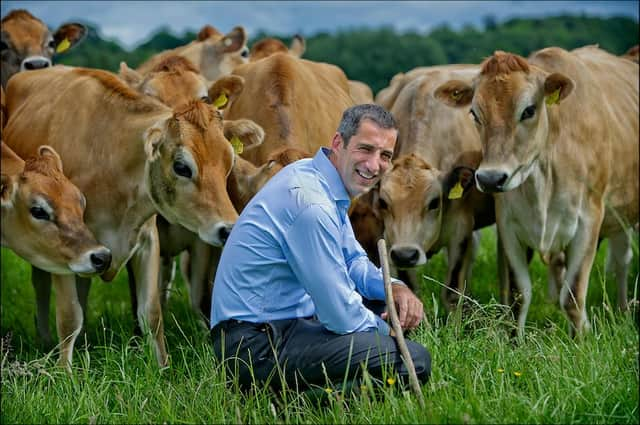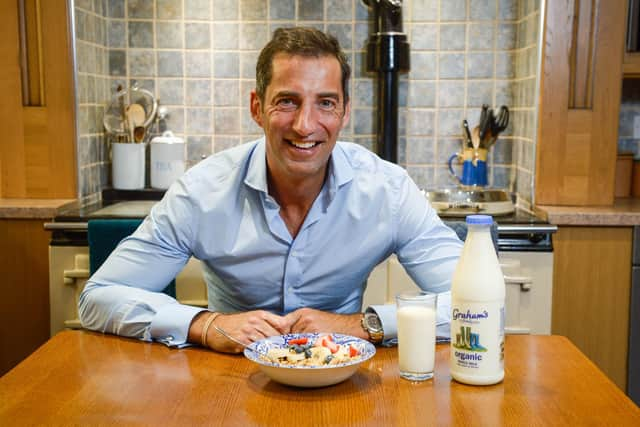The Big Interview: Robert Graham, MD of Graham’s The Family Dairy


Robert Graham is the managing director of Graham’s The Family Dairy, which claims to be the number one Scottish food brand and has grown through three generations of dairy farmers. It also says that more than half of households in Scotland buy its products. Graham joined the firm in 1991 aged 21, working in every department from milking cows to delivering the milk until he took over from his father as MD in 1996.
How has the business been able to function during the Covid-19 crisis and what changes have you had to make?
Advertisement
Hide AdAdvertisement
Hide Ad

More than 1,500 of our valued food service industry customers had to close their doors. This has had a significant negative impact on the business, despite the uplift in volumes across some of our customers. Our main objective was to minimise the impact on our colleagues and particularly our 100 farming partners, as it is not an option for them to stop milking their cows.
The daily conversations with our retail customers enabled us to quickly get to grips with changing consumer shopping trends, keeping our teams updated with as much information and guidance as we can in the ever-changing landscape.
We very quickly mobilised our teams across the country to be in a position to offer a personal doorstep delivery service to more people and areas across Scotland who were affected by lockdown.
The surge in scratch cooking and home baking was also unparalleled. Certainly, butter has been the one stand-out dairy product, and our sales doubled across our spreadable and block butters. Our fantastic teams worked through the increased volatility in demand and made sure we did everything we could to hit orders for our customers and help protect the business. Doing so ensured customers had great tasting Scottish dairy products on shelves.
What have been the main challenges and what impact has it had on your finances?
When lockdown closed down all our 1,500 foodservice customers – 15 per cent of our business – this created a significant shock, particularly as the milk from our farmers was already planned in. This cannot be “turned off” – it is planned 12 months in advance. This was a major challenge.
The firm was recently named Scotland’s number one chosen food brand. How has that been achieved and what impact do you think that will have in the future?
It has been achieved with 80 years of hard work starting with my grandfather, father, and the family as it is today. The work ethic is the foundation, and over the years opportunities we’ve sought to grow and develop the business to the position it is in today.
Advertisement
Hide AdAdvertisement
Hide AdThe three components to this growth and ultimately taking us to Scotland’s number one chosen food brand have been an acquisition strategy especially throughout the 1990s, the launch of Graham’s The Family Dairy brand in 2006, and new product development.
We hope that this will allow us to continue to be seen by our customers as a real competitor to the large global brands that we compete with for listings, and importantly for our consumers to understand more about our brand story while seeing us a brand they can trust for great tasting, healthy dairy products.
How is Brexit going to affect the business and what measures are you planning to take?
I believe that the experience over the past few months shows that more needs to be invested in the processing side of the dairy industry, and the potential threat from Brexit is also concerning.
As a business we are preparing for what we can do so that great tasting dairy products are on the shelves no matter what the outcome is for Brexit. The UK is the second biggest importer of dairy products after China. This will present challenges and opportunities for the dairy industry, but our strategy is to continue to deliver great tasting, innovative, Scottish dairy products that customers are increasingly looking for.
What are the chief business goals and aims over the coming year, and further ahead?
Our family business has evolved through the strong heath credentials of dairy combined with Graham’s provenance and innovation. Given consumers’ increasing demand for healthy products alongside great taste and an authentic story, we are in a strong place to continue to grow and develop dairy products.
How do you evolve as a family business? Does that bring any particular issues with regard to strategy and succession?
Advertisement
Hide AdAdvertisement
Hide AdRemembering that we are a family first and that we all have our own skill strengths and contributions that we make to the business. It is from this position that we work towards our agreed vision and strategy. We have been lucky that as a family we have ultimately been aligned to where we would like to take the business.
Succession is on the mind of any business and especially family businesses. When my sister and I were growing up although we worked in the business during school holidays there was no expectation from our parents for either of us to join. The business was, however, there should we decide to join and as a parent that is all you can do – have a good business with a strong management structure and give support should children have the desire and ability to work in the business.
Are there plans to revisit the dairy/housing expansion project after it faced setbacks?
In our last financial year alone our capital investment was over £6 million. Our plans for Airthrey Kerse would not only allow us to step-change our investment in the Scottish dairy industry and create a large number of jobs, but also help address the housing shortage in Stirling, where the Scottish Government target of new housing has failed to be met since 2005.
However, twice now the Scottish Government has refused planning and twice, including in the last few weeks, we have challenged this decision in the Court of Session, where it has again been found that Scottish Government unlawfully refused our plans.
Leaving aside the waste of taxpayers’ money by Scottish Government through their failure to deliver land for new, sustainable housing, what is equally frustrating is the loss of economic opportunity, skills development and creation of a significant amount of new jobs the development can immediately deliver. The planning application will now go back again to the Scottish ministers for the third time.
How do you tackle sustainability/environmental issues, given government efforts to grow the green economy?
As a third generation family farming business, who have become Scotland’s largest independent dairy, we support the drive for innovative, sustainable solutions and actively work to make positive ecological changes across every area of our dairy business.
Advertisement
Hide AdAdvertisement
Hide AdWe are accelerating our investment of new products made in Scotland. We have ambitious plans to transition our business to net zero [carbon], with recent projects including a 15MW solar park, as well as plans to move our [vehicle] fleet to biomethane and reduce supply chain waste.
Our proposed low carbon heat project at our Glenfield site in Cowdenbeath, Fife, responds to the Scottish Government’s energy targets of 100 per cent net zero by 2045, with 50 per cent by 2030. As heat accounts for 50 per cent of Scotland’s energy demand, decarbonising this sector is viewed as central to achieving these targets.
As part of the Scottish Government’s flagship Low Carbon Innovation Transition Programme for Heat and Industry, this project was awarded grant support to deliver the proposed development alongside a Skills Development and Information Exchange to support Fife’s Clean Growth Agenda. We are delighted that Glenfield has been selected by the Scottish Government to deliver a first for Scotland, utilising waste residues for the production process for on-site energy.
Our customers are also more committed than ever to reducing the amount of packaging they use. The majority of our business is still carton or PET packaging and we work with packaging firm Nampak on the best and most sustainable solutions.
Recyclable packaging solutions are high on our priority list and ensure our customers that all our tubs and lids across our ranges are widely recyclable. Between 75 per cent and 80 per cent of milk bottles are recycled, making them UK’s most recycled container. We also launched our doorstep delivery service last year to include milk in glass bottles. We have a responsibility to adapt, drive and deliver change.
A message from the Editor:
Thank you for reading this story on our website. While I have your attention, I also have an important request to make of you.
The dramatic events of 2020 are having a major impact on many of our advertisers - and consequently the revenue we receive. We are now more reliant than ever on you taking out a digital subscription to support our journalism.
Subscribe to scotsman.com and enjoy unlimited access to Scottish news and information online and on our app. Visit https://www.scotsman.com/subscriptions now to sign up. By supporting us, we are able to support you in providing trusted, fact-checked content for this website.
Joy Yates
Editorial Director
Comments
Want to join the conversation? Please or to comment on this article.